INTRODUCTION

Whenever i think about portable solid state drives there are two things i mostly care about, size and performance. Yes, other things like storage capacity, enclosure durability, connectivity and even warranty are also very important but at least for me size and performance always come first. A couple of years back Kingston released their very first USB 3.2 Gen 2x2 portable SSD called the XS2000 which ended up being an overall success both due to its size and very good performance levels (up to 2000MB/s). Still excluding all the recent mid/high-end motherboard models USB 3.2 Gen 2x2 (USB4 is the obvious successor to that right now) is not widely used and so in order to grab a larger piece of the market Kingston took a step back by just releasing the USB 3.2 Gen 2 XS1000 line of portable SSDs.
Kingston Technology Europe Co LLP and Kingston Technology Company, Inc., are part of the same corporate group (“Kingston”). Kingston is the world’s largest independent manufacturer of memory products. From big data, to laptops and PCs, to IoT-based devices like smart and wearable technology, to design-in and contract manufacturing, Kingston helps deliver the solutions used to live, work and play. The world’s largest PC makers and cloud-hosting companies depend on Kingston for their manufacturing needs, and our passion fuels the technology the world uses every day. We strive beyond our products to see the bigger picture, to meet the needs of our customers and offer solutions that make a difference. To learn more about how Kingston Is With You, visit Kingston.com.
The brand new XS1000 USB 3.2 Gen 2 Portable SSD by Kingston is currently available in just 1/2TB capacities and strangely enough it's also based on the quad-channel (32 CEs) SM2320G NAND flash controller by Silicon Motion just like its faster predecessor, the XS2000. Now for earlier portable SSD models the obvious culprit here would normally be the USB controller/interface but since the SM2320G is an USB 3.2 Gen 2x2 NAND flash controller my guess is this has to do either with the controller’s firmware (most likely scenario) or the 3D TLC NAND flash modules Kingston has used this time over. Whichever the case Kingston advertises the XS1000 as being able to reach just over half the speeds of the XS2000. As for the SM2320G controller once again it fully supports Silicon Motion's latest NANDXtend ECC end-to-end data path protection but even though it also supports real time AES 256-bit encryption for full compliance with the Trusted Computing Group - TCG Opal 2.0 specification the XS1000 doesn't carry that feature.

 O-Sense
O-Sense







.png)

